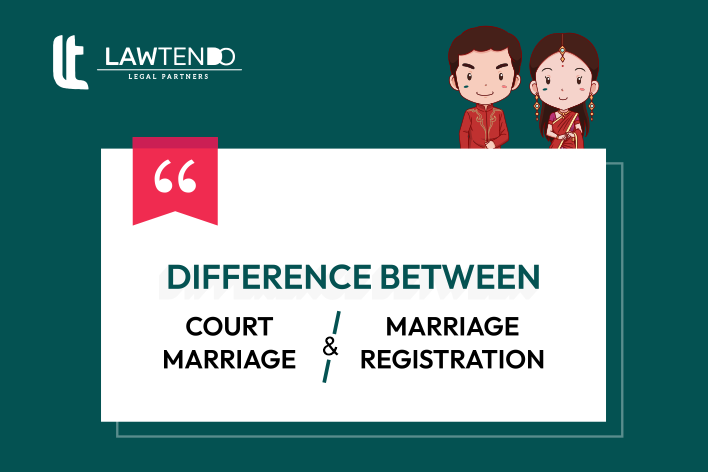Difference between Court Marriage & Marriage Registration

Date : 18 Apr, 2022
Post By Vishal Kumar
DIFFERENCE BETWEEN COURT MARRIAGE AND MARRIAGE REGISTRATION WHAT IS A COURT MARRIAGE? Court marriages are simpler and more convenient that proper traditional marriages. Their ambit is very wide when it comes to the eligibility of people under court marriage. To begin with, a court marriage is a simple marriage that takes place in the presence of three witnesses and one marriage officer who solemnise the marriage. Court marriages do not require any rituals to be performed. The presence of the people who are getting married along with three witnesses is enough for marriage solemnization. This is the reason why court marriages are pocket-friendly and convenient for people. One more reason for them being wide and friendly is that people from different religious backgrounds can also marry by court marriage as long as the conditions of the special marriage act are met. The special marriage act is a document that allows people who belong to different religious backgrounds to marry one another. The special marriage act also applies to foreign nationals who want to marry Indians.
ELIGIBILITY FOR COURT MARRIAGE-
Both parties are required to be living separately at the time of solemnization of marriage.
Both parties should be eligible to marry- the bride should be above 18 years of age and the groom should be above 21 years of age.
The parties should be sound-minded.
Parties should be capable of giving valid consent at the time of the marriage.
DOCUMENTS REQUIRED
An application form regarding the marriage needs to be there which will be signed by both parties.
Birth certificates as evidence should be there.
Proof of residence of both the parties is required
Since the parties are not allowed to marry if they are already married and their spouse is living, the parties are therefore required to present a divorce decree or a death certificate in case they were married earlier.
The parties should not be related to each within the degree of prohibited relationship.
PROCESS UNDERTAKEN FOR COURT MARRIAGE
Step 1 – Notice of marriage is to be given by the parties to the marriage officer in their district.
Step 2 – The marriage officer will publish the notice and wait for people to object to the notice for up to 30 days.
Step 3- If there is no objection within a period of 30 days, the officer can perform the marriage. The objection in this step has to have a legal background and not any personal motivations.
Step 4- Witnesses are required to be present before the marriage officer on the day of solemnization of marriage. Their signatures are also required.
Step 5 – The marriage officer will issue the marriage certificate once these steps have been performed correctly.
MARRIAGE REGISTRATION
Marriage is considered to be a sacred tie between two people. The marriage between Hindus is governed by the laws of the Hindu Marriage Act. A marriage registration certificate is legal proof of marriage between two people. The law has mandated the marriage registration certificate that protects the rights of women after marriage. A marriage certificate acts as proof not only of marriage but also of other things such as issuance of a passport or changing of surname after the marriage.
CONDITIONS OF A VALID MARRIAGE BETWEEN TWO HINDUS
Both parties should be Hindus.
Both parties should be eligible to marry in terms of their age.
Both parties shouldn’t be within the prohibited degrees of relationship.
Both parties should not be of unsound mind and should be capable of giving valid consent.
DOCUMENTS REQUIRED
An application form needs to be submitted along with proof of marriage. The proof of marriage consists of pictures of invitation cards, marriage ceremonies, and rituals.
Age and address details as evidence and proof are required to see whether the marriage was legal and valid.
An affidavit issued by the executive magistrate is needed which can attest to the validity of the marriage between both parties.
Proof that the parties are not related to each other within the prohibited degrees of relationship.
When a marriage in the form of court marriage is solemnised between a foreign national and an Indian, the provisions of the Special Marriage Act apply. The special marriage act requires that at least one of the parties is Indian and resides temporarily in India. The documents required are the same as in the court marriages under Hindu Marriage Act but the only additional requirement is that both parties need to submit their passports as well.
CASE LAWS
In the case of Pranav A.M. v. Secy Engandiyum Gram Panchayat- the court held that if the marriage is performed after the conversion of the parties to Hinduism, the marriage has to be legally solemnised. It cannot be barred on any grounds under the Hindu Marriage act.
In the case of Pranav A.M. v. Secy Engandiyum Gram Panchayat- The court held that registration of an invalid marriage will not render it valid under any law.
WHY LAWTENDO
Lawtendo is a platform for you to help in hiring legal counsel. We work twenty-four hours to provide the best lawyers who suit the needs of the customers. We work with a wide range of lawyers whose areas of expertise range from divorce, court marriage, and registration, property possession delay, cheque, and money recovery; to will drafting and agreement, employment issues, and builder disputes. In addition to this, we also deal with cases of wrongful dishonour of cheques. Lawtendo is a hassle-free platform that works rigorously to make sure the best lawyer reaches their client in time.





